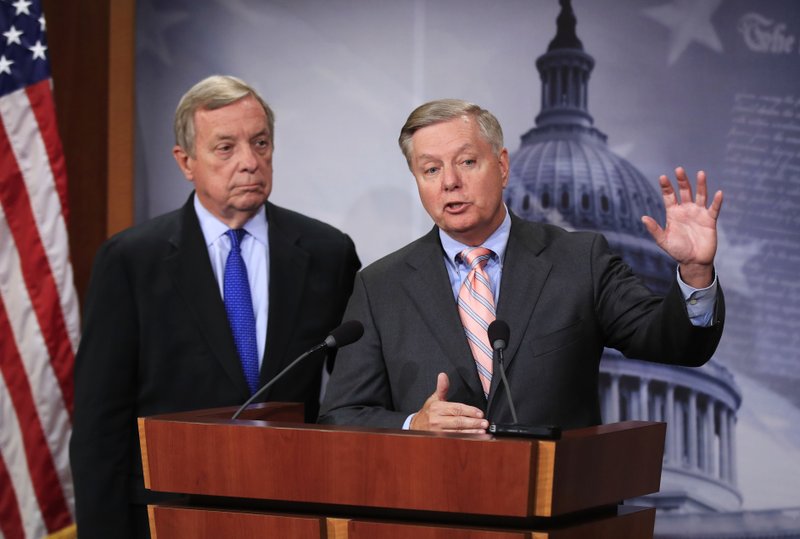WASHINGTON -- A bipartisan agreement among a handful of senators to prevent deportation of hundreds of thousands of young illegal aliens includes a pathway to citizenship that would take up to 12 years, plus $1.6 billion for structures that include a wall for border security, according to details obtained Saturday by The Associated Press.
President Donald Trump and some GOP congressional leaders have already said the bipartisan deal is insufficient. Its proponents -- led by Sens. Dick Durbin, D-Ill., and Lindsey Graham, R-S.C. -- say they are continuing to round up supporters in hopes of building momentum for their plan.
The agreement between three Republican and three Democratic senators would prevent deportation of hundreds of thousands of so-called Dreamers, who were brought to this country as children and are in the U.S. illegally. The term "Dreamer" is based on the never-passed Development, Relief, and Education for Alien Minors Act, which would have given protections similar to those provided by the Deferred Action for Childhood Arrivals program, the initiative from President Barack Obama's time in office that Trump wants to terminate.
The senators had been working for months on how to balance those protections with Trump's demands for border security, an end to a visa lottery aimed at increasing immigrant diversity, and limits to immigrants' ability to sponsor family members to join them in America.
On Saturday, Trump sought to blame Democrats for the lack of an immigration deal.
"I don't believe the Democrats really want to see a deal on DACA. They are all talk and no action. This is the time but, day by day, they are blowing the one great opportunity they have. Too bad!" Trump tweeted as he arrived at his private golf club in West Palm Beach, Fla.
Political battle lines have intensified since Trump's vulgar description of African nations and derogatory comments about Haiti at a White House meeting Thursday, and the deal's fate is uncertain.
One of the six senators who crafted the deal, Democrat Michael Bennet of Colorado, said Saturday that the proposal "has everything the president asked for on the border." He said that if Trump can't support it, "it's difficult to see how we could get him to agree to anything that could pass in Congress."
It was unclear now how a deal might emerge, though both sides insist the clock is ticking.
A showdown is expected by Friday, the deadline for Congress to approve a spending bill to prevent a government shutdown the next day. Some Democrats are threatening to withhold needed votes for the budget measure unless there's an immigration accord.
The bipartisan Senate compromise includes a 12-year pathway to citizenship. That can be reduced by up to two years for time in the U.S. under the Deferred Action for Childhood Arrivals program.
There is also an additional $1.1 billion for surveillance technology and retaining and relocating Border Patrol agents. Other steps include body cameras, rescue beacons and more investigators for Border Patrol.
The deal also contains changes to a visa lottery program, which distributes up to 50,000 visas annually to people from countries that send few immigrants to the U.S.
Instead, half those visas would go to people from "priority countries" with low rates of immigration to the United States.
The other half of the visas would go to people currently receiving temporary protected status. Trump has curtailed that status for people from El Salvador, Haiti, Sudan and Nicaragua.
Late Saturday night, the federal government, citing a recent court order, said it has resumed the acceptance of requests for grants of deferred action under the DACA program.
Last week, a federal judge in California said the nearly 690,000 DACA recipients must retain their work permits and their protection from deportation while a lawsuit challenging the program's end moves forward.
On Saturday night, U.S. Citizenship and Immigration Services said people previously granted deferred action under DACA may request renewal by filing the proper forms, but that it is not accepting new requests.
Information for this article was contributed by Jill Colvin and staff members of The Associated Press, and by Martin Weil and Clarence Williams of The Washington Post.
A Section on 01/14/2018
